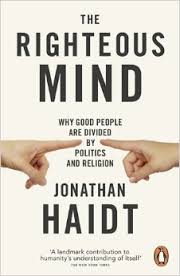



 Jonathan Haidt (pronounced ‘height’) is a social psychologist and ethics professor. He tackles the very interesting relationship between intuition and reasoning. The Righteous Mind is a little heavy going at times, as one might expect of moral psychology, but well worth the effort if you are at all interested in why people are so divided about politics and religion. He explores why good and smart people come to very different conclusions and why they get so righteous about it.
Jonathan Haidt (pronounced ‘height’) is a social psychologist and ethics professor. He tackles the very interesting relationship between intuition and reasoning. The Righteous Mind is a little heavy going at times, as one might expect of moral psychology, but well worth the effort if you are at all interested in why people are so divided about politics and religion. He explores why good and smart people come to very different conclusions and why they get so righteous about it.
Drawing on twenty-five years of groundbreaking research, Haidt shows how moral judgements arise not from reason but from intuition, and why we evolved to be this way. Realizing that morality binds people together but also blinds them to other’s reasoning, is helpful in understanding friends, enemies, colleagues, and fellow citizens as never before. After reading the book, I’m already listening differently to political rhetoric and have a better understanding of why attack ads are so annoyingly effective. The author does try to make the book as readable and approachable as possible, using intriguing analogies like these: “The mind is divided, like a rider on an elephant, and the rider’s job is to serve the elephant.” and “Human beings are 90 percent chimp and 10 percent bee,” (chimps being selfish and bees being self-less).
 Haidt’s main observation is that we are more intuitive than we know. Reasoning is simply something we do to justify a position we already hold. Reasoning seldom persuades unless our intuition can be changed. In politics, how many people meticulously sift through policies or platforms? Probably most rely on a gut feeling about the person they are voting for. In an interview, despite the stellar resume before us, if our gut tells us that the person before us is not right for the job, we are not likely to hire them. Often it’s difficult for us to explain exactly why we think something is right or wrong or be able to come up with an articulate argument about it. People are not easily persuaded by reasoning, but if you walk a mile in another man’s moccasins, well, that can make a difference.
Haidt’s main observation is that we are more intuitive than we know. Reasoning is simply something we do to justify a position we already hold. Reasoning seldom persuades unless our intuition can be changed. In politics, how many people meticulously sift through policies or platforms? Probably most rely on a gut feeling about the person they are voting for. In an interview, despite the stellar resume before us, if our gut tells us that the person before us is not right for the job, we are not likely to hire them. Often it’s difficult for us to explain exactly why we think something is right or wrong or be able to come up with an articulate argument about it. People are not easily persuaded by reasoning, but if you walk a mile in another man’s moccasins, well, that can make a difference.
Haidt says, “Empathy is an antidote to righteousness, although it’s very difficult to empathize across a moral divide.” The author’s goal is to drain some of the anger and divisiveness out of these topics, and replace them with wonder and curiosity so that it will help people to get along. The hope is to make conversations about morality, politics, and religion more common, more civil, and much more fun.


Well I haven’t read the book, and I probably won’t because it sounds like too much heavy slogging for me and I have enough on my bedside table that is heavy slogging–however your review of this book tells me this author would understand the couple’s therapy I do… which is not based on reason but on gut–though the couples I work with tell me again and again that this “gut” way of understanding love makes incredible sense to them. Don’t know what I am talking about? Read Love Sense by Sue Johnson. Joanne has reviewed it.
One thing though, I might disagree with him on: When we walk in another’s shoes with authenticity, our bee-ish part is way bigger than 10%.